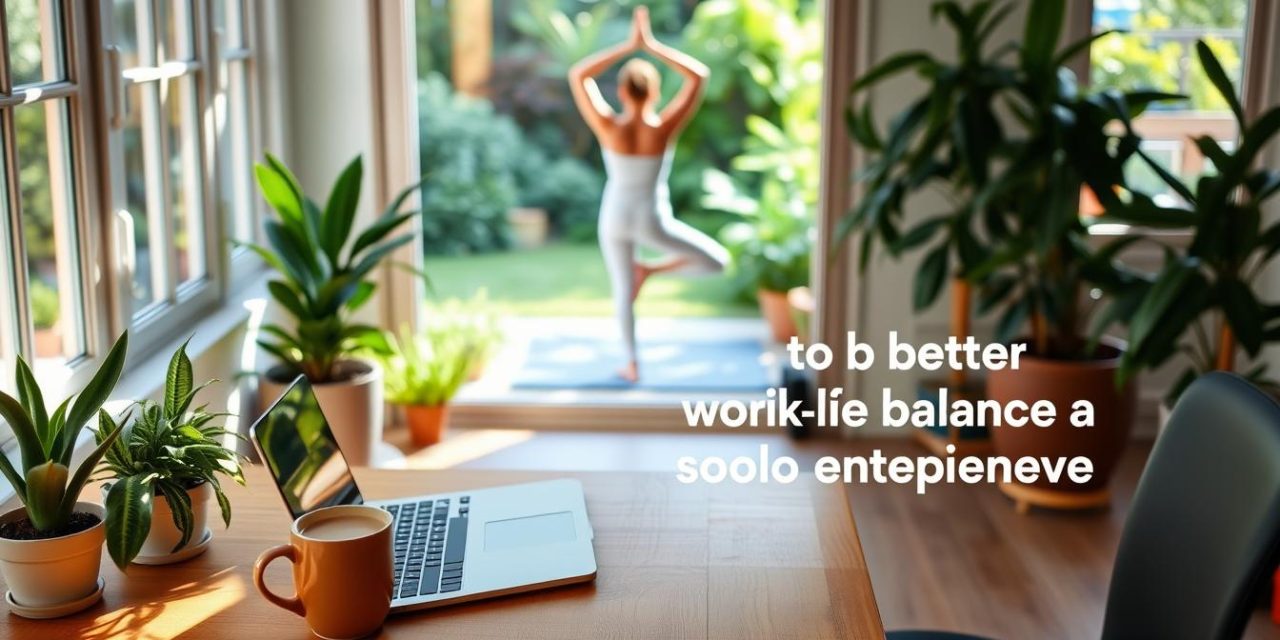As a solo entrepreneur, managing your time effectively is crucial. A recent study by Aviva revealed that since the pandemic, people have become more focused on achieving a better balance between their professional and personal lives.
Maintaining a healthy balance is particularly challenging for solo entrepreneurs, as they often juggle multiple roles and struggle with blurred boundaries between work and personal life. This comprehensive guide will explore practical strategies for achieving a better equilibrium, helping you reclaim your time and reduce stress.
Table of Contents
Key Takeaways
- Discover practical strategies for achieving a better work-life balance as a solo entrepreneur.
- Learn how to manage your time more effectively to reduce stress.
- Understand the importance of balance for business success and personal fulfillment.
- Explore customizable approaches adaptable to different business models and personal circumstances.
- Create sustainable practices that support long-term success without sacrificing your health or relationships.
Understanding Work-Life Balance for Solo Entrepreneurs
The flexibility of being a solo entrepreneur can be both a blessing and a curse when it comes to achieving work-life balance. On one hand, it allows for the freedom to create your own schedule; on the other, it can lead to the blurring of boundaries between work and personal life.
What Work-Life Balance Really Means
Work-life balance doesn’t mean an equal division of time between work and personal activities. Instead, it’s about finding a balance that allows you to meet your professional obligations while also nurturing your physical and mental well-being. It’s a state where you feel in control of your work and have the energy to enjoy your personal life.
Achieving this balance requires a conscious effort to manage your time effectively, setting clear boundaries between work and personal life to reduce stress.
Unique Challenges for Solo Entrepreneurs
Solo entrepreneurs face distinct challenges that can make maintaining a healthy work-life balance difficult. Some of these challenges include:
- The absence of clear boundaries between work and personal time, leading to the « always-on » syndrome.
- Financial pressures that make it hard to justify taking time off, even when approaching burnout.
- Lack of support systems, making it difficult to delegate tasks when needed a break.
- The passion for their business can become a double-edged sword, making it harder to step away from work when necessary.
- Isolation can be a significant challenge, missing out on the social aspects of a traditional workplace.
Understanding these challenges is the first step towards finding effective solutions to manage work hours and maintain a healthy work-life balance.
Why Work-Life Balance Matters for Entrepreneurs
The importance of work-life balance for entrepreneurs cannot be overstated, as it directly impacts their physical and mental health, as well as their business performance. Entrepreneurs often wear multiple hats, and the lines between work and personal life can easily blur, leading to burnout. According to the Oxford Economic, « Replacing an employee costs on average around £30,000 and it takes up to 28 weeks to get them up to speed. » For solo entrepreneurs, the cost of burnout can be even more significant, as there’s often no one to immediately take over essential business functions.
Physical and Mental Health Benefits
Maintaining a healthy balance between work and personal life has numerous physical and mental health benefits. When entrepreneurs prioritize their well-being, they’re more likely to experience reduced stress levels, improved sleep quality, and increased energy levels. This, in turn, can lead to a stronger immune system and a reduced risk of chronic diseases. By making time for activities outside of work, entrepreneurs can also cultivate new interests and nurture meaningful relationships, contributing to overall mental well-being.
Improved Business Performance and Creativity
A healthy balance between work and personal life can also have a positive impact on business performance and creativity. When entrepreneurs take breaks and engage in activities outside of work, they can return to their business with renewed energy and focus, leading to increased productivity and creativity. This can help entrepreneurs stay ahead of the curve, adapt to changing market conditions, and make informed decisions that drive business success.
Sustainable Long-Term Success
Achieving a balance between work and personal life is essential for success in the long term. By adopting a marathon mindset rather than a sprint approach, entrepreneurs can ensure that their business is sustainable and viable over time. This involves building a business that supports life goals, rather than consuming them, and creating a system that can function without the entrepreneur’s constant presence. By doing so, entrepreneurs can achieve true freedom and the possibility of a positive exit strategy when desired. Some key strategies for achieving sustainable long-term success include:
- Building a business that supports life goals, rather than consuming them
- Maintaining relationships and interests outside of work to provide crucial support systems
- Creating a system that can function without the entrepreneur’s constant presence
- Prioritizing physical and mental well-being to maintain energy and focus
By prioritizing work-life balance, entrepreneurs can set themselves up for long-term success and create a business that is both sustainable and fulfilling.
Signs Your Work-Life Balance Needs Attention
As a solo entrepreneur, it’s essential to recognize the signs that indicate your work-life balance is off. Ignoring these signs can lead to burnout, decreased productivity, and negatively impact your business.
Physical Warning Signs
Your body can be a significant indicator of an imbalance in your work-life balance. Chronic fatigue, frequent illnesses, and changes in appetite or sleep patterns can signal that you’re overworking. Neglecting physical health can lead to long-term consequences, including cardiovascular diseases and a weakened immune system.
Mental and Emotional Red Flags
Mental and emotional strain can manifest in various ways, including irritability, mood swings, and a lack of motivation. It’s crucial to acknowledge these signs and take proactive steps to manage stress and maintain mental well-being. According to Mind Share Partners’ 2021 Mental Health at Work report, employees are only performing at around 72 percent of their full capacity due to stress and other work-related mental health issues.
Business Impact Indicators
An imbalanced work-life balance can also affect your business performance. Signs include declining quality of work, missed deadlines, and increased client complaints. A table summarizing these indicators is provided below:
| Indicator | Description | Impact |
|---|---|---|
| Declining Quality of Work | Subpar performance and lack of attention to detail | Client dissatisfaction and potential loss of business |
| Missed Deadlines | Failure to meet project timelines | Damaged reputation and loss of trust |
| Increasing Client Complaints | Rise in customer grievances | Erosion of client base and negative word-of-mouth |
Recognizing these signs and taking corrective action can help you restore balance and improve your overall well-being and business performance.
Creating Boundaries Between Work and Personal Life
Establishing boundaries between your work and personal life is vital for solo entrepreneurs to ensure long-term success. As a solo entrepreneur, it can be challenging to separate your work and personal life, but setting clear boundaries is essential for maintaining a healthy work-life balance.
Setting Clear Working Hours
Setting clear working hours is crucial for maintaining a healthy work-life balance. By defining your working hours, you can avoid the temptation to work excessively long hours or check work emails during your personal time. This helps you maintain a clear distinction between your work and personal life, reducing the risk of burnout.
Establishing a Dedicated Workspace
Creating a dedicated workspace is another effective way to establish a boundary between your work and personal life. By designating a specific area for work, you can avoid the temptation to work in areas meant for relaxation, such as your living room or bedroom. This helps you maintain a clear distinction between your work and personal space.
Using Technology to Enforce Boundaries
Technology can be both a blessing and a curse when it comes to maintaining a work-life balance. On one hand, it allows you to work remotely and be more flexible. On the other hand, it can blur the boundaries between your work and personal life. To mitigate this, you can use apps to block distracting websites during work hours and block work tools after hours. Consider using separate devices for work and personal activities, or at minimum, separate user profiles, browsers, or email accounts. You can also automate email responses outside of working hours to manage client expectations while protecting your personal time. For more tips on achieving a better work-life balance, visit our blog at work-life balance tips.
By implementing these strategies, you can maintain a healthy balance between your work and personal life, leading to increased productivity and overall wellbeing. You can also explore digital wellness features on your smartphones and computers to gain insights into your usage patterns and establish healthier technology habits.
Effective Time Management Strategies for Solo Entrepreneurs
As a solo entrepreneur, managing your time effectively is crucial for achieving a better work-life balance. With multiple responsibilities and limited resources, it’s easy to get overwhelmed. However, by implementing the right time management strategies, you can maximize productivity, reduce stress, and focus on growing your business.
Time Blocking Techniques
Time blocking involves scheduling your tasks into fixed, uninterrupted blocks of time. This technique helps you prioritize your work, avoid multitasking, and make the most of your work hours. By dedicating specific times to specific tasks, you can ensure that you’re making progress on your most important projects.
Prioritization Methods
Effective time management requires prioritizing your tasks based on their urgency and importance. The Eisenhower Matrix is a useful tool for categorizing tasks into four quadrants: urgent & important, important but not urgent, urgent but not important, and not urgent or important. This helps you focus on the tasks that will have the greatest impact on your business.
Delegation and Outsourcing Options
As a solo entrepreneur, it’s tempting to think you need to do everything yourself. However, delegating and outsourcing tasks can be a game-changer. Identify tasks that drain your energy, fall outside your core expertise, or have a lower return on investment, and consider hiring help or automating them. This can free up more time for you to focus on high-leverage activities that drive business growth.
| Task | Time Saved | Impact on Business |
|---|---|---|
| Delegating administrative tasks | 5 hours/week | Increased productivity |
| Automating repetitive tasks | 3 hours/week | Reduced errors |
| Outsourcing specialized tasks | 2 hours/week | Improved quality |
Taking Care of Your Physical Health

Taking care of your physical health is essential for achieving a healthy work-life balance as a solo entrepreneur. When you prioritize your physical wellbeing, you’re not only improving your health but also boosting your energy levels and enhancing your overall performance.
Incorporating Movement Throughout Your Day
Incorporating physical movement into your daily routine can significantly impact your energy levels and productivity. Simple actions like taking a short walk during breaks, using a standing desk, or doing a few stretching exercises can make a big difference. Aim for at least 30 minutes of moderate-intensity exercise throughout the day to keep your energy levels stable and improve your overall health.
Nutrition Strategies for Busy Entrepreneurs
A well-balanced diet is crucial for maintaining your energy levels and supporting your overall health. As a busy entrepreneur, it can be challenging to prioritize nutrition, but simple strategies like meal planning, preparing healthy snacks, and staying hydrated can help. Focus on consuming nutrient-dense foods such as fruits, vegetables, whole grains, and lean proteins to support your health and performance.
Prioritizing Sleep and Rest
Quality sleep is non-negotiable for entrepreneurial success, directly impacting decision-making, creativity, emotional regulation, and long-term health. Establishing a consistent sleep schedule that allows for 7-9 hours of rest is crucial, even when business demands are high. Creating a wind-down routine, optimizing your sleep environment, and recognizing the importance of rest beyond just sleep are all strategies that can help improve your overall wellbeing and performance.
| Aspect | Strategy | Benefit |
|---|---|---|
| Movement | Incorporate short walks and stretching exercises | Boosts energy and productivity |
| Nutrition | Meal planning and healthy snacking | Supports overall health and energy |
| Sleep | Establish a consistent sleep schedule | Improves decision-making and creativity |
By prioritizing your physical health through movement, nutrition, and sleep, you can achieve a better balance between your work and personal life, leading to improved overall health and performance.
« A poor work-life balance can lead to a variety of symptoms that can affect our wellbeing. This ranges from the flu to serious health conditions like strokes and respiratory problems. »
Maintaining Mental Wellbeing as a Solo Entrepreneur
Mental wellbeing is a foundational element for solo entrepreneurs, influencing their resilience and business acumen. As the backbone of their own venture, solo entrepreneurs face a myriad of challenges that can impact their mental health. Therefore, it’s essential to adopt strategies that foster mental wellbeing.
Mindfulness and Stress Reduction Techniques
Mindfulness practices, such as meditation and deep breathing exercises, can significantly reduce stress levels. Incorporating these techniques into daily routines can enhance mental clarity and overall wellbeing. Mindfulness is not just a practice, but a mindset that can transform the way solo entrepreneurs navigate challenges.
Building a Support Network
Building a support network is vital for solo entrepreneurs. This network can include peers, mentors, and professionals who understand the unique challenges of entrepreneurship. Having a supportive community can provide emotional sustenance and valuable insights, helping entrepreneurs navigate through tough times.
When to Seek Professional Help
If feelings of overwhelm or being stuck persist, seeking professional help can be invaluable. A coach or counselor can provide guidance on identifying necessary changes and implementing them. Recognizing the need for professional support is a sign of strength, not weakness. It’s about being proactive about one’s mental health, just as one would with any other aspect of their business.
- Be aware of warning signs that indicate the need for professional mental health support, such as persistent low mood or anxiety.
- Understand the different types of support professionals available, including therapists, counselors, coaches, and psychiatrists.
- Consider investing in mental health as a business investment, impacting decision-making, creativity, and leadership capabilities.
Achieving Work-Life Balance While Working Remotely
For solo entrepreneurs, working from home requires intentional strategies to separate work from personal life. Achieving a balance between your professional and personal life is crucial when your workspace is also your living space.
Creating Meaningful Work Rituals
Establishing a dedicated workspace is key. Even something as simple as consistently sitting in the same dining room chair can help your brain recognize when it’s time to focus—and when it’s time to unplug. Creating meaningful work rituals, such as starting your day with a specific routine, can signal to your brain that it’s time to work.
Avoiding the « Always On » Trap
It’s easy to fall into the trap of being « always on » when working from home. To avoid this, set clear working hours and stick to them. Using technology to your advantage, such as apps that help you stay focused or block social media during work hours, can also help. For more insights on personal fulfillment and happiness, you can explore resources like personal fulfillment.
Separating Work Space from Living Space
Physical separation between work and living spaces creates psychological boundaries that help your brain transition between professional and personal modes. If space is limited, use visual and physical cues to transform a single area between work and personal use. For instance, using a specific desk lamp that’s only on during working hours or covering equipment at the end of the day can help.
By implementing these strategies, solo entrepreneurs can better achieve a work-life balance while working remotely, improving both their personal well-being and business productivity.
Planning for Time Off and Vacations
Time off is not just a luxury, but a necessity for entrepreneurs to maintain their physical and mental well-being. As a solo entrepreneur, it’s crucial to plan your time off carefully to ensure that your business continues to run smoothly while you’re away.
Preparing Your Business for Your Absence
Before you take time off, make sure to prepare your business by wrapping up urgent tasks, setting clear expectations with clients, and automating processes where possible. This will help minimize disruptions and ensure a smooth transition.
Setting Client Expectations
Communicate your time off plans with your clients in advance to manage their expectations. Set up an auto-response on your email and inform them of when you’ll be available again. This will help prevent last-minute requests and allow you to fully disconnect.
Fully Disconnecting During Time Off
To truly benefit from your time off, it’s essential to disconnect from work-related tasks. Log out of email, silence notifications, and engage in activities that require your full attention. By doing so, you’ll be able to recharge and return to work with renewed energy and perspective.
Some strategies to achieve this include implementing technology boundaries, such as deleting email apps or turning off notifications, and planning engaging activities that make it harder to mentally drift back to work concerns. Celebrate your successful disconnection as a business achievement, recognizing that your return to work will bring renewed energy and perspective.
Finding Fulfillment Outside of Work

While your business is a significant part of your life, it’s essential to cultivate other areas that bring you purpose and joy. As a solo entrepreneur, your work can be all-consuming, but maintaining a healthy balance between your professional and personal life is crucial for your overall wellbeing.
Cultivating Hobbies and Interests
Engaging in hobbies and interests outside of work can bring you joy and help you recharge. Whether it’s painting, hiking, or reading, make time for activities that stimulate your creativity and provide a sense of accomplishment. By doing so, you’ll be able to maintain a healthy balance between your work and personal lives.
Nurturing Personal Relationships
Nurturing personal relationships is vital for emotional support and connection. As a solo entrepreneur, it’s easy to get caught up in work, but investing time in family and friends can provide a sense of belonging and purpose. Make an effort to stay connected with loved ones and build meaningful relationships outside of your business.
Contributing to Something Bigger Than Your Business
Consider how you can contribute to causes or communities that align with your values. This could involve volunteering or mentoring, which not only benefits others but also provides a sense of fulfillment and perspective. By giving back, you’ll be able to maintain a broader perspective and achieve a better balance in your life.
Conclusion: Creating Your Personalized Work-Life Balance Plan
To maintain a healthy work-life balance, it’s essential to be aware of your priorities and limitations. As a solo entrepreneur, your work and personal life are closely intertwined, making it challenging to separate the two. However, by understanding your needs and setting boundaries, you can create a sustainable rhythm that works for you.
Here are some key takeaways to help you achieve a better balance:
– Regularly assess your current situation to identify areas where imbalance is causing strain.
– Set concrete, measurable goals, such as ending work by 6 pm four days a week.
– Implement changes gradually, recognizing that sustainable habit formation requires consistent small steps.
By following these steps and staying committed to your goals, you can create a healthy work-life balance that supports both your business success and personal wellbeing. For more insights on how to boost your freelance career, consider exploring resources like portage salarial, which can provide valuable guidance on achieving a better balance between work and personal life.
FAQ
How can I establish a healthy routine as a solo entrepreneur?
To establish a healthy routine, start by setting clear working hours and creating a dedicated workspace. This will help you separate your work and personal life, reducing the likelihood of burnout.
What are some effective time management strategies for solo entrepreneurs?
Effective time management strategies include time blocking, prioritization methods, and delegation or outsourcing tasks when possible. These techniques can help you maximize productivity and minimize stress.
How can I maintain my mental wellbeing as a solo entrepreneur?
Maintaining mental wellbeing involves practicing mindfulness and stress reduction techniques, building a support network, and seeking professional help when needed. It’s also essential to take breaks and engage in activities outside of work.
What are some signs that my work-life needs attention?
Signs that your personal and professional life needs attention include physical warning signs like chronic fatigue, mental and emotional red flags such as increased anxiety, and business impact indicators like decreased productivity.
How can I achieve a better balance between my work and personal life while working remotely?
Achieving a better balance while working remotely involves creating meaningful work rituals, avoiding the « always on » trap, and separating your work space from your living space. This can help you maintain a clear distinction between work and personal time.
Why is taking care of my physical health important as a solo entrepreneur?
Taking care of your physical health is crucial as it directly impacts your energy levels, productivity, and overall wellbeing. Incorporating movement into your day, maintaining a healthy nutrition strategy, and prioritizing sleep are essential for sustaining your business and personal life.
How can I plan for time off and vacations as a solo entrepreneur?
Planning for time off involves preparing your business for your absence, setting client expectations, and fully disconnecting during your time off. This ensures that your business continues to run smoothly while you recharge.





